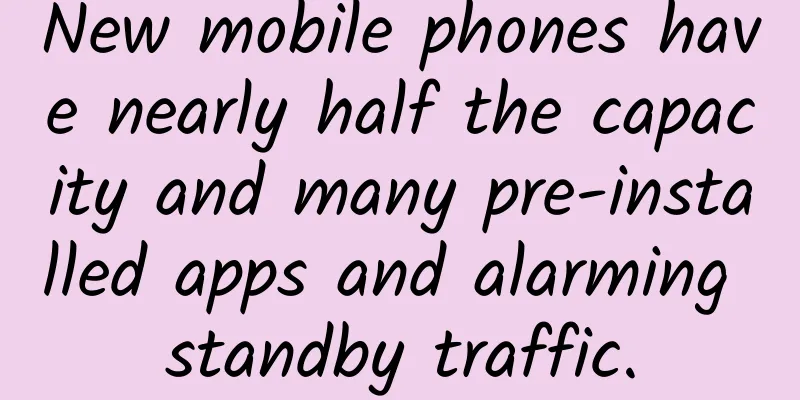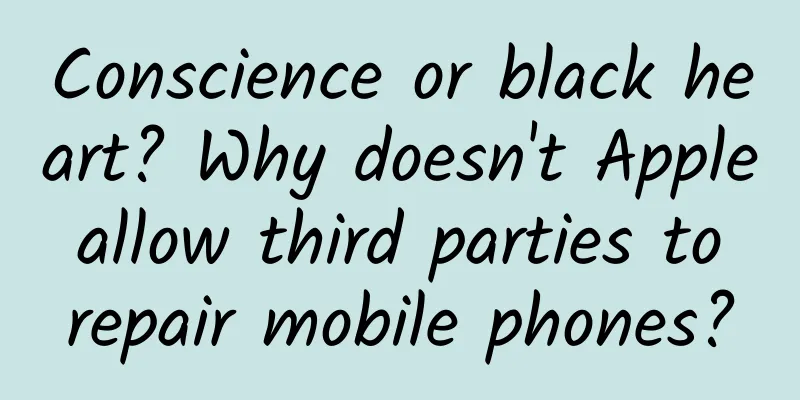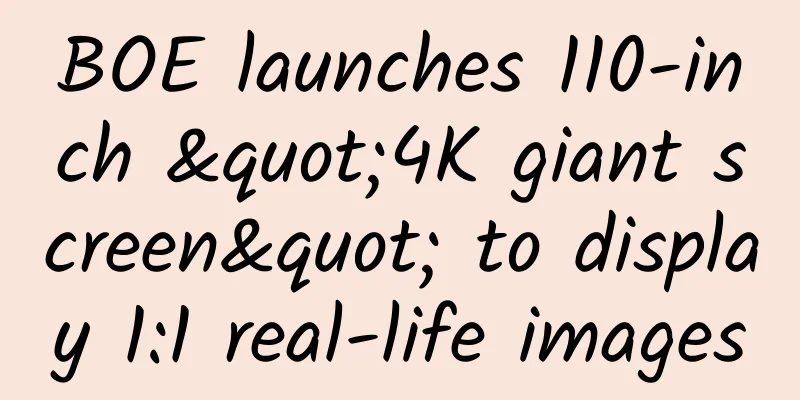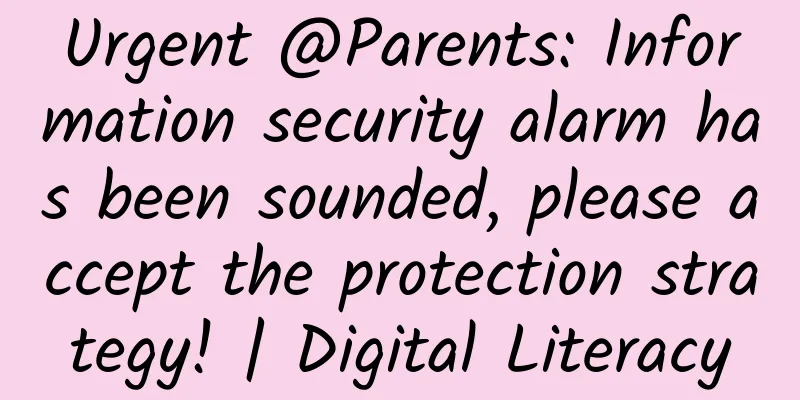In the "big battle" of garbage classification mini programs, what are the strengths and weaknesses of BAT respectively?
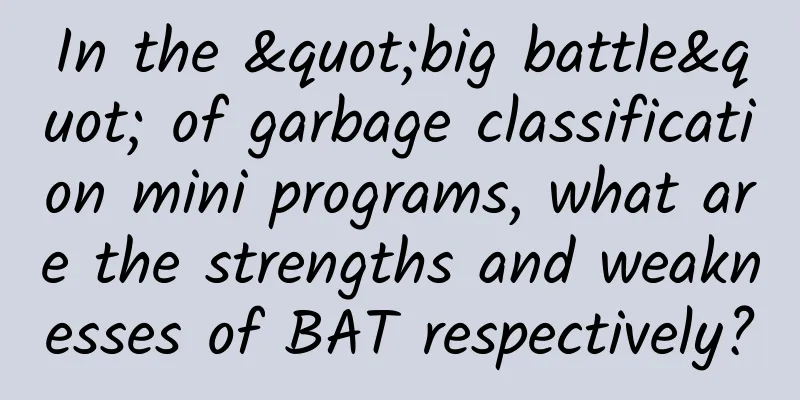
|
BAT's mini program has started the "Garbage War". As a long-term policy that will change China's environmental protection future, various places have also started to implement the countdown after Shanghai. The public's demand for garbage sorting-related services will become stronger and stronger with the arrival of the era of garbage sorting for all. While the Internet was full of ridicule about the inconvenience caused by the strictest garbage sorting, some users have begun to learn and understand it by using related mini programs. BAT has also done its best to help users learn and even deal with garbage sorting earlier. From a personal perspective, a mini program that can only play small games and shop online has no "value" in life. At least in the current mobile Internet world, if mini programs are missing, there will be other ABC products as "substitutes" for these two demands. In the "Garbage War", Tianhao truly felt the significance of the existence of mini programs. Low-frequency long-tail demands such as garbage classification in daily life will always exist now and in the future. The various small and large programs backed by super apps provide a satisfactory answer to the above problems. This is the greatest value of mini programs to the world. Nowadays, mini programs have gradually become a standard feature of major companies, including the mini program platform launched by 360 this month and the mini program launched by Toutiao last year. But for now, BAT is still the three core players in mini programs, with traffic, ecology, and technical accumulation. Mini programs make life simple. Judging from this garbage check war, which of BAT performs better? The following will explain in detail. Strong attention brings new opportunities for mini programs Chinese people are not unfamiliar with garbage classification. It has been advocated since the 1990s. At present, garbage classification bins of various colors have been everywhere in major cities. However, garbage classification is a complete chain from classified placement, classified collection, classified transportation, and classified treatment. It is just that user habits have not been formed and relevant policies have lagged behind. Although the country has been calling for garbage classification and many cities have also carried out relevant pilot projects, garbage classification has generally become a decoration in the past. However, as the garbage classification system will be included in the law, Shanghai will become the first city to implement mandatory garbage classification. Beijing and other provinces and cities will also implement mandatory garbage classification soon. It is reported that on July 1, Shanghai issued 623 rectification orders, which means that not only will you be fined for "disposing" garbage randomly, but it will also affect your personal credit. As the saying goes, the power of habit is irresistible. The garbage classification that has been ignored by everyone has suddenly become extremely important. In order to "catch up" on garbage classification, netizens have turned on the "learning" mode. (Baidu Index for “Garbage Classification”) On July 1, the Baidu Index of garbage classification reached 1,418,230, more than a thousand times higher than the index six months ago; similarly, the WeChat Index of "garbage classification" (which can be displayed for up to 90 days) also soared within 90 days, with the index value of 370,562 on April 4 and 56,238,083 on July 2. The sudden strong attention of netizens has given rise to the "garbage classification" economy, which has greatly benefited not only mini-programs, but also companies and platforms related to garbage classification. (Baidu search results VS WeChat search results) You should know that after garbage classification became popular, searching for these four words in the Baidu APP search box and WeChat search results will naturally recommend related mini-programs. The first recommended mini-program on Baidu APP is the "Garbage Classification Assistant" mini-program, and the mini-program module in the WeChat search results recommends the "Garbage Classification Guide" mini-program. Of course, you can search for mini programs related to garbage classification on Alipay, QQ, Toutiao, Douyin and other super apps. Tianhao tried it out as soon as possible and was pleasantly surprised but also found many shortcomings. What are the advantages and disadvantages of BAT's "garbage classification"? WeChat was the first to take action on the hot topic of "garbage classification". On June 29, the official WeChat account of Tencent WeChat team recommended four mini-programs related to garbage classification. In addition to providing query, tutorials, identification and other functions, there are also games related to "garbage classification". As a pioneer in the field of mini-programs, WeChat leads all players in terms of the number of users and service providers. WeChat revealed at its first offline open class in 2019 in Shanghai on June 27 that as of June 2019, 8,200 service providers had launched a total of 630,000 mini-programs. The official WeChat account launched four garbage classification mini-programs at once, showing the activeness of service providers in the WeChat ecosystem. In fact, these four are just the four representatives officially "appointed". According to the WeChat team, there are currently more than 100 garbage classification mini-programs on the platform. In terms of quantity, Tencent is undoubtedly the leader among the three BAT companies. What is more noteworthy is that the first one recommended by the official microblog, "How to sort domestic waste", is a query platform provided by the Shanghai Municipal Greening and Urban Appearance Administration and Shanghai Publishing. Just enter the name of the waste in the search box to display the waste classification of the waste. The second one is the "Garbage Classification Guide" developed by an individual developer, which provides more abundant text and picture-related information. The third "Garbage Classification Tool" was developed by Shanghai Changjing Technology Co., Ltd. It is a small program that focuses on taking photos to identify the type of garbage. The recognition rate is average in actual tests. The fourth "Garbage Classification" shows that the developer is Shanghai Youzu Charity Foundation, which is a small game with the theme of garbage classification. It can be said that WeChat mini-programs are far superior to the latter two in terms of the number of mini-programs, the diversity of developers, and the subdivision of mini-program types. The disadvantage is that the services provided by the relevant mini-programs are mostly knowledge-based, and there is no deeper "connection" to garbage classification. Considering that the "hot spot" of garbage classification has only recently begun to explode, the problem of shallow connection is still acceptable. At the same time, it also exposes a new problem on WeChat. There are as many as hundreds of garbage classification mini-programs. If it is not recommended by the official WeChat account, it is still a hassle for users to find "the one" mini-program that suits them. Especially in WeChat’s method of attracting customers through sharing, it is more difficult for users to find suitable mini-programs, which is sometimes a disadvantage. Alipay Like WeChat, Alipay also launched a small program related to garbage classification at the first time. According to Alipay, due to the impact of Shanghai's implementation of the most stringent garbage classification measures, more than 60 individual developers in East China alone have applied to develop small programs related to garbage classification on the Alipay platform. However, from the current point of view, there are not many results for searching garbage classification in the Alipay small program search box, less than 10, which is far less than WeChat. In terms of types, Alipay’s mini-programs include query, tutorial, and image recognition, but there is no mini-program in the form of the “trash points” mini-game on WeChat. It can be said that Alipay has a big gap compared to WeChat in terms of the number and types of mini-programs, but the advantage is that Alipay has obvious competitiveness in sinking the entire service chain. When users enter the query of recyclable garbage such as "wine bottles" in the "Garbage Classification Guide" applet of Alipay, there will be an "appointment for door-to-door service" in the results. Users can click to directly make an appointment for door-to-door "garbage collection" service. This entrance opens up "Easy to Throw", and users can also directly choose the garbage recycling service through the Easy to Throw applet. After testing, Tianhao found that the city of Zhuozhou where he is located cannot use this service yet. However, according to public information from Alipay, the service has supported 155 cities, of which domestic waste recycling covers more than 8,000 communities in 11 cities, and a total of more than 2 million people have placed orders on the platform to "sell garbage." Moreover, users of Yidairei do not get money in exchange for garbage, but Ant Forest Energy. Depending on the size of the recyclables, users can get different amounts of Ant Forest Energy. At present, Yidairei is only connected to the Garbage Classification Guide applet, and is not linked to other applet. It can be seen that the advantage of Alipay over WeChat is that Alipay can provide deeper service support in connecting offline services. Just in terms of recycling garbage, it involves Alipay accounts, Ant Forest Energy, location sharing and other functions. It is difficult for WeChat, which is mainly social, and Baidu, which is mainly search/information flow, to provide such a deep service chain. The shortcomings are also obvious. Users on Alipay, which is a tool, will lack the patience to "discover" mini-programs, and user acquisition will be a hassle. Baidu attracts traffic through search, WeChat can attract traffic through chat boxes, WeChat groups, Moments, search, and mini-program discovery, while Alipay's traffic channels are relatively simple and can only be obtained through search or platform recommendations. Moreover, the user purposes on Alipay are relatively direct. For mini-program types that are not closely related to payment, credit points, commodity transactions, etc., the Alipay ecosystem lacks application scenarios, especially in entertainment-related aspects. For example, the lack of mini-programs such as garbage classification games on Alipay is a good proof. Baidu With the public's demand for garbage classification knowledge acquisition, Baidu, the world's largest Chinese search engine, naturally has the most advantages. Therefore, in addition to mini-programs, Baidu APP also supports typing "XXX is what kind of garbage" in the search box to directly display relevant results. Compared with the conventional results of Baidu search for the three-part combination of "title-picture-introduction", Baidu APP provides a targeted design for querying garbage classification, because Baidu itself is a search tool. Another advantage over WeChat and Alipay is that when searching for “garbage classification” directly on Baidu APP, the first result is a small program called “Garbage Classification Assistant”. Users don’t even need to click to open the small program first. In the search box below the small program on the result page, users can also directly enter content in this box to search. The search that Baidu relies on is to solve the problem of users obtaining information. Therefore, in terms of entry, Baidu is far ahead of Alipay and WeChat. Because on the latter two platforms, users need at least two or three or even more operations to open the small program. The ability to reach the small program faster is Baidu’s biggest advantage. The shortcomings are also obvious. Currently, there are less than 10 smart mini-programs related to search and garbage classification. Moreover, as a platform that excels in AI, it uses the name of smart mini-programs to differentiate itself from WeChat and Alipay, but it loses a battle in combining AI with garbage classification needs. For example, there are garbage classification mini-programs on WeChat and Alipay that can recognize garbage by taking photos. WeChat is slightly better in recognition rate (the success rate is not high either), but there are no mini-programs that support image recognition in the Baidu mini-program search results. It has to be said that this is a mistake in the operation of smart mini-programs. It should have been a good opportunity for Baidu's image recognition technology to debut. There is another problem. From the perspective of the garbage classification smart applet service function, the relevant applet undoubtedly overlaps with some functions of the Baidu APP search engine. In fact, this problem is widespread in the Baidu smart applet ecosystem. From the depth of service, it is obvious that the breadth of knowledge obtained by directly searching "garbage classification" on Baidu is far greater than that of the relevant smart applet. How can smart applet similar to "information, knowledge" achieve differentiated positioning with Baidu search? This is a problem that Baidu needs to consider in the future. What surprised Tianhao was that Baidu set up an entrance to the smart mini program under some Baijiahao articles related to garbage classification. This will be a new entrance to Baidu's smart mini program that is more vertical, accurate and has huge traffic. In general, Baidu has a genetic advantage, and the services it provides are consistent with the tone of the mini program, but it is slightly inferior to Alibaba and Tencent in terms of traffic, ecological integrity and business acumen. The above are some of my personal experiences after using the mini programs on various platforms around the hot topic of garbage classification. According to the white paper on the development of the mini program industry in the first half of 2019 released by Aladdin, as of December 2019, WeChat's DAU exceeded 320 million from 250 million in June last year, and the activity of the entire industry is rising. However, e-commerce, shopping, and game mini programs still account for a high proportion. The above types of mini programs, which are highly replaceable, account for too high a proportion and are not of great value to users. After all, users have many channels to obtain these services. On the contrary, mini programs similar to the "garbage classification" life service type have irreplaceable advantages for both platforms and users. Mini Programs can be seen as the "Apple Store" within Super APPs. Just as all iOS applications are influenced by Apple's strategies, the different Mini Program ecosystems created by BAT will also present some inherent characteristics due to the characteristics of the Super APP parent body. These characteristics determine their advantages and disadvantages. WeChat's advantage is that there are more enthusiastic service providers on the platform, but its disadvantage is that it lacks control over the downstream mini-programs, forming a complex and complicated empire. Users can only open their eyes and ignore the interference from Moments, WeChat groups, and private messages from friends, and go to "Taobao" to choose the mini-program that suits them best. Alipay's advantage lies in its accumulation in e-commerce, payment, credit, and offline services. In its advantageous areas, it can provide in-depth services that other platforms cannot provide, but its shortcomings will be fully exposed in its disadvantaged areas. Baidu has an advantage in the fit between its product genes and mini-programs, but it still has a long way to go in terms of traffic, ecology, and technology empowerment. Just like Pinduoduo directs WeChat users to the APP, players of a mini game or mini program will eventually convert to downloading an independent APP because of platform benefits (game settings for downloading) and in-depth services. On the contrary, services like garbage classification, which do not have independent APPs as support, are the best destination for mini programs. To develop an independent APP, they need a long time, technical thresholds and the review of major application platforms. On the contrary, developing a mini program is the best choice, and it can be implemented by leveraging the platform's traffic and rich functional modules. From the user's perspective, some troubles in life can be solved through mini programs, and they will also rely more on the mini program ecosystem. On the contrary, the group-buying e-commerce and shopping mini programs that attract people with "discounts" will lose their appeal once these platforms cancel the "discount activities". In short, long-tail services are the real purpose of mini programs and the services that users need most. Now BAT has developed some popular mini programs just to popularize users' awareness of the mini program. No matter what, BAT will eventually move towards the goal of connecting all services with mini programs. Sorting garbage is undoubtedly a big test for mini programs. BAT has demonstrated the advantages of their own ecosystems. For users and service providers, which mini program is better to choose? The answer must be the one that solves the real pain points. |
<<: iOS 13 Beta 3 released with new features and changes
>>: Why don’t Huawei and Xiaomi make mobile phones for men?
Recommend
These 10 cognitions may be the gap between you and the UI designers of big companies
As UI design continues to gain popularity, althou...
Is the Internet speed slow when using data? With this simple setting, the mobile Internet speed will be much faster
We all have data packages for our mobile phones. ...
How much does it cost to develop a Linyi aquatic products mini program? Linyi aquatic product small program development price inquiry
How much is the quotation for Linyi aquatic produ...
Papaya breast enlargement, massage to make breast bigger... These breast enlargement tips are not reliable
This article was reviewed by Yu Qi, chief physici...
Get a full refund from VATTI World Cup, and talk about the 5 correct approaches to new media marketing
The World Cup is over, France won the championshi...
Facebook pays tribute to Steve Jobs on his 60th birthday
I don't want to go to work because I'm la...
Product analysis and material optimization are two essential skills for information flow advertising optimizers!
In fact, everyone has read a lot of useful inform...
This little black box can crack the passcode of almost any iPhone
It doesn't matter whether you add a fingerpri...
Hot search! You may be eating this illegal meat product exposed by the 3.15 Gala
This year's 3.15 Gala revealed that some pre-...
3000 words to understand Weibo operation and promotion routines!
Why do I operate Weibo? Because browsing Weibo is...
International Day of Persons with Disabilities | We may be different, but we can all…
Producer: Chen Kaixing, Zou Shengwen Producer: Yu...
Can rice, flour, grain, oil and condiments be eaten after their expiration date? The answer is different from what you think
Many people always think that rice, flour, grain,...
6 major types of user growth projects, just do it!
Growth is a part that operators cannot escape. Us...
Interpreting the “Ten Articles of WeChat”, what changes have they brought?
At present, instant messaging tools represented b...
Why Surface Pro 3 is both loved and hated
Microsoft has released the third generation of Sur...

